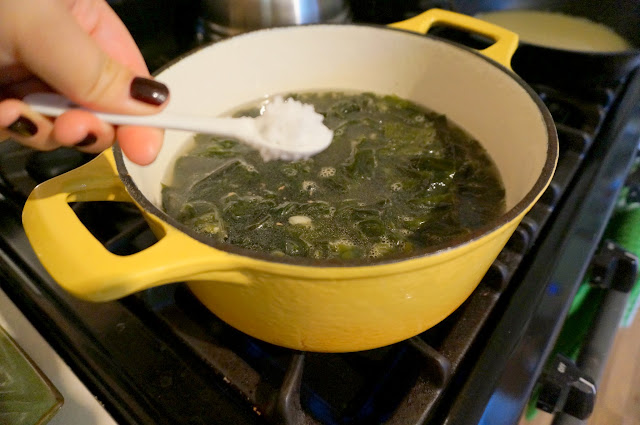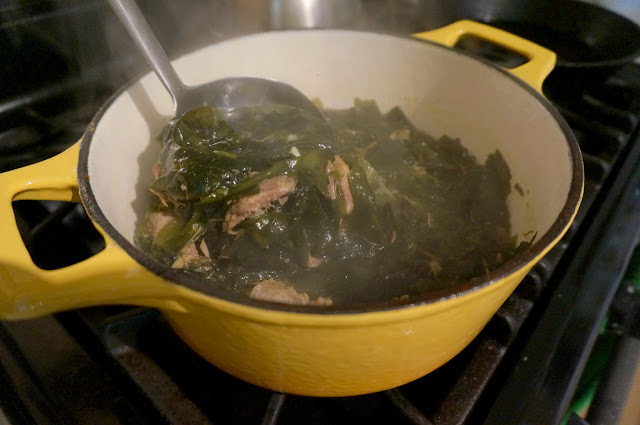Korean Seaweed Soup | Miyuk Guk (미역국)
Autumn is birthday season in our house - Dad and sister in October, me in November, (and in the past, my mom's was in September and my grandmom's was in November). Birthday season in a Korean household means one thing: miyuk guk, a.k.a. seaweed soup. My mom said the tradition of miyuk guk was born (quite literally) because its incredibly nutrient-rich properties made it an ideal concoction for expectant mothers and brand new mothers. So, relatives would bring the soup to the new moms and therefore, it became associated with births.
Mom used to say that it was good luck to have miyuk guk on your birthday because it was like toasting to one's own health by eating this super Vitamin-filled meal.
So, last month for my pop's 60th, I made a big batch of miyuk guk. My mom used to make miyuk guk with flank steak or brisket. I'm a non-traditionalist and also a whatever's-in-the-freezer-ist so I tend to use oxtails. However, seeing as it was kind of a special occasion (a man's sixtieth birthday only comes once in a lifetime) I grabbed a package of short ribs. Short ribs are super fatty and rich, which means that even after the broth bubbles away, the meat itself is still moist and delicious. Normally, I hate soup meat because it's dry and not-so-yummy but this time, I was all about it.
Ingredients [serves 4 to 6]:
1 lb. short ribs or oxtails
8 cups water
4 cloves garlic
½ oz. dried seaweed (wakame)
1 teaspoon sesame oil
salt to taste
You'll have to start by making the broth. I've shared the broth making process a couple of times already so I skipped the photo diary. But basically, you want to soak the meat for 1 to 2 hours in water just to draw out the myoglobin; the goal is to have a clearer broth. Then, rinse and drain the meat and put it into a stock pot. Top with water (about 8 to 10 cups) and add in a few crushed garlic cloves (skins on or off, it doesn't make a difference). Then, bring to a boil and then reduce the heat to a simmer and leave to cook for a couple of hours or until the meat is tender. Skim off scum and fat (which is easier to do when the soup has cooled and refrigerated).
A few hours before you're ready to make your soup, soak the seaweed. The seaweed should soak for about 2 hours, which will give it time to release its salt (it's crazy salty) and rehydrate.
Grab a pot and add some sesame oil and heat over medium, Throw in the drained seaweed and saute for a few minutes. Then, pour in the stock and season with salt. Let the soup bubble away for 20 to 30 minutes. I usually cook it just long enough for the stock to turn green.
Meanwhile, shred up the beef and then add it to the soup just a few minutes before you're going to serve, just to warm it through.
Ladle everyone a generous portion - and give the birthday boy/girl an extra generous portion - and serve piping hot.
I would like to say that the table is so full because it was a special occasion. However, this is a typical Korean meal for my family because we're fatsos. We usually have a soup or stew, some sort of kimchi (in this case we have a kale moochim and some radish greens kimchi that my cousin made for us), some sort of protein (we had samgyupsal a.k.a. pork belly), and various other banchan (we'd made kimchi mandu over the weekend with homemade kimchi).
Miyuk guk was a childhood favorite of mine - I used to pretend I was just drinking a bowlful of ocean water and that I was a mermaid - and it's still one of my favorites. The seaweed has some slimy bits and some crunchier bits, which can be offputting to some, but I love it. And I'm someone who is super picky about the texture of my food so that's saying something.
On top of being yummy, seaweed has lots of iodine, calcium, and Vitamins A and C. And sure, you may not get a boost of these awesome benefits from the nori in one salmon skin roll but that's why you supplement your meals every so often with a big bowl of miyuk guk.
Here's the recipe page:
Mom used to say that it was good luck to have miyuk guk on your birthday because it was like toasting to one's own health by eating this super Vitamin-filled meal.
So, last month for my pop's 60th, I made a big batch of miyuk guk. My mom used to make miyuk guk with flank steak or brisket. I'm a non-traditionalist and also a whatever's-in-the-freezer-ist so I tend to use oxtails. However, seeing as it was kind of a special occasion (a man's sixtieth birthday only comes once in a lifetime) I grabbed a package of short ribs. Short ribs are super fatty and rich, which means that even after the broth bubbles away, the meat itself is still moist and delicious. Normally, I hate soup meat because it's dry and not-so-yummy but this time, I was all about it.
Ingredients [serves 4 to 6]:
1 lb. short ribs or oxtails
8 cups water
4 cloves garlic
½ oz. dried seaweed (wakame)
1 teaspoon sesame oil
salt to taste
You'll have to start by making the broth. I've shared the broth making process a couple of times already so I skipped the photo diary. But basically, you want to soak the meat for 1 to 2 hours in water just to draw out the myoglobin; the goal is to have a clearer broth. Then, rinse and drain the meat and put it into a stock pot. Top with water (about 8 to 10 cups) and add in a few crushed garlic cloves (skins on or off, it doesn't make a difference). Then, bring to a boil and then reduce the heat to a simmer and leave to cook for a couple of hours or until the meat is tender. Skim off scum and fat (which is easier to do when the soup has cooled and refrigerated).
A few hours before you're ready to make your soup, soak the seaweed. The seaweed should soak for about 2 hours, which will give it time to release its salt (it's crazy salty) and rehydrate.
Grab a pot and add some sesame oil and heat over medium, Throw in the drained seaweed and saute for a few minutes. Then, pour in the stock and season with salt. Let the soup bubble away for 20 to 30 minutes. I usually cook it just long enough for the stock to turn green.
Meanwhile, shred up the beef and then add it to the soup just a few minutes before you're going to serve, just to warm it through.
Ladle everyone a generous portion - and give the birthday boy/girl an extra generous portion - and serve piping hot.
I would like to say that the table is so full because it was a special occasion. However, this is a typical Korean meal for my family because we're fatsos. We usually have a soup or stew, some sort of kimchi (in this case we have a kale moochim and some radish greens kimchi that my cousin made for us), some sort of protein (we had samgyupsal a.k.a. pork belly), and various other banchan (we'd made kimchi mandu over the weekend with homemade kimchi).
Miyuk guk was a childhood favorite of mine - I used to pretend I was just drinking a bowlful of ocean water and that I was a mermaid - and it's still one of my favorites. The seaweed has some slimy bits and some crunchier bits, which can be offputting to some, but I love it. And I'm someone who is super picky about the texture of my food so that's saying something.
On top of being yummy, seaweed has lots of iodine, calcium, and Vitamins A and C. And sure, you may not get a boost of these awesome benefits from the nori in one salmon skin roll but that's why you supplement your meals every so often with a big bowl of miyuk guk.
Here's the recipe page:


















Comments
Post a Comment
I'd love to hear what you have to say!